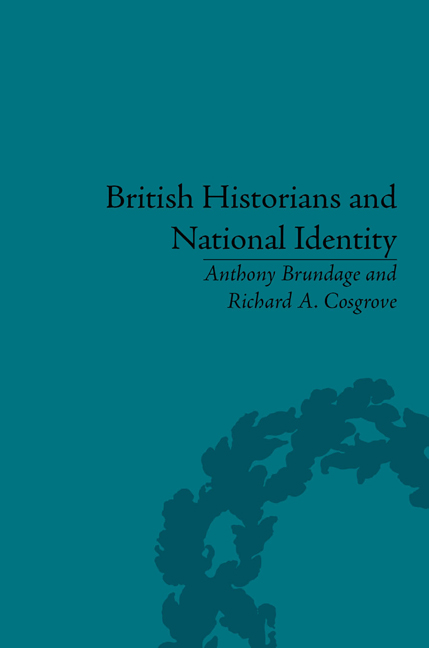Book contents
- Frontmatter
- CONTENTS
- Dedication
- Acknowledgements
- Introduction
- 1 Demythologizing the Nation's Past: David Hume's History of England
- 2 Catharine Macaulay's Vindication of Radicalism and the Republican Tradition
- 3 Reassessing Religion and the National Narrative: John Lingard and the English Reformation
- 4 Placing the Constitution at the Heart of National Identity: Henry Hallam and Constitutional History
- 5 Thomas Babington Macaulay: Writing the History of a Progressive People
- 6 The Glories of the Reformation and the Origins of Empire: J. A. Froude's Celebration of the Tudor Era
- 7 Edward Augustus Freeman: Liberal Democracy and National Identity
- 8 William Stubbs: The Continuity of English History as National Identity
- 9 Celebrating the People: J. R. Green's Short History
- 10 Samuel Rawson Gardiner: Incorporating Dissent into the National Story
- 11 In Thrall to English Tradition and Character: G. M. Trevelyan's Panoramic Histories of the Island Race
- 12 The Anglosphere as Global Model: Winston Churchill's History of the English-Speaking Peoples
- Conclusion
- Notes
- Works Cited
- Index
4 - Placing the Constitution at the Heart of National Identity: Henry Hallam and Constitutional History
- Frontmatter
- CONTENTS
- Dedication
- Acknowledgements
- Introduction
- 1 Demythologizing the Nation's Past: David Hume's History of England
- 2 Catharine Macaulay's Vindication of Radicalism and the Republican Tradition
- 3 Reassessing Religion and the National Narrative: John Lingard and the English Reformation
- 4 Placing the Constitution at the Heart of National Identity: Henry Hallam and Constitutional History
- 5 Thomas Babington Macaulay: Writing the History of a Progressive People
- 6 The Glories of the Reformation and the Origins of Empire: J. A. Froude's Celebration of the Tudor Era
- 7 Edward Augustus Freeman: Liberal Democracy and National Identity
- 8 William Stubbs: The Continuity of English History as National Identity
- 9 Celebrating the People: J. R. Green's Short History
- 10 Samuel Rawson Gardiner: Incorporating Dissent into the National Story
- 11 In Thrall to English Tradition and Character: G. M. Trevelyan's Panoramic Histories of the Island Race
- 12 The Anglosphere as Global Model: Winston Churchill's History of the English-Speaking Peoples
- Conclusion
- Notes
- Works Cited
- Index
Summary
Pride in the antiquity and virtues of the English constitution have a long tradition in English identity. Phrases such as the ancient constitution and the Norman Yoke point to the way in which political discourse and attachment to the constitution have enjoyed an extensive history. In 1777, for example, the Earl of Chatham invoked the genius of the constitution to resolve political disputes. The Duke of Wellington, in the debate prior to the introduction to the Reform Bill of 1830, insisted that the constitution had achieved a level of perfection that precluded any further alteration. Charles Dickens's Mr Podsnap in Our Mutual Friend stated: ‘We Englishmen are Very Proud of our Constitution, Sir. It Was Bestowed Upon Us By Providence.’ Patriotic sentiments focused on: ‘trial by jury, habeas corpus, Magna Carta, the Petition of Right and Bill of Rights, taxation by means of elected representatives, the restriction of monarchical powers within a tightly controlled executive, the parliamentary franchise and frequent parliamentary elections’. Contemplation of the constitution had frequently served to impart private wisdom as well as to suggest correct public policy; such a constitution was indeed a ‘pearl of great price’. At the beginning of the nineteenth century, therefore, the emphasis on constitutional glory as part of national identity lacked only a chronicler.
To unite constitutional enthusiasm and national identity became the mission of Henry Hallam (1771–1859).
- Type
- Chapter
- Information
- British Historians and National IdentityFrom Hume to Churchill, pp. 55 - 66Publisher: Pickering & ChattoFirst published in: 2014



